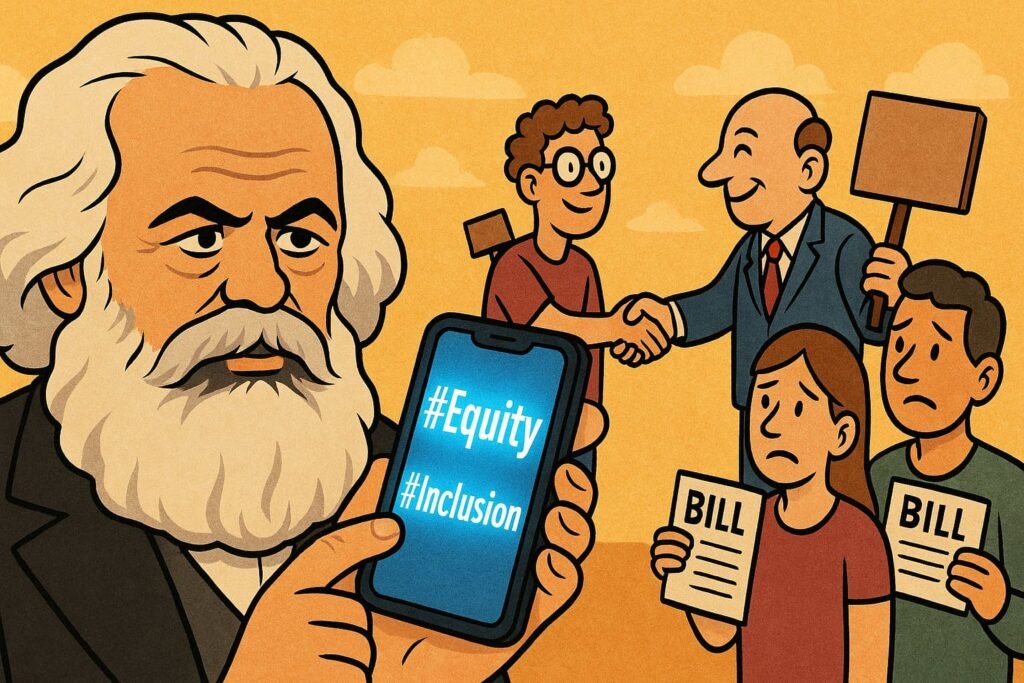Cultural Marxism Explained – The Ghost Story of Modern Politics
Few phrases get tossed around in culture wars as much as “Cultural Marxism” For some, it’s a grand conspiracy: Marxists swapping the hammer and sickle for hashtags and diversity training. For others, it’s a lazy insult, waved at anything progressive.
So what is Cultural Marxism? A secret communist plot? A real academic theory? Or just a political ghost story — endlessly recycled to scare or explain the times?
Table of contents
What Is Cultural Marxism?
The term “Cultural Marxism” didn’t come from a Soviet manual. It came from critics trying to explain why Marx’s revolution never arrived in the West. If workers weren’t rising up, maybe culture — not just economics — was the real battlefield.
The basic idea: instead of bourgeoisie vs proletariat, the struggle shifted to majority vs minority, tradition vs liberation, old values vs new identities.
The Frankfurt School and Critical Theory
The roots go back to the Frankfurt School in the 1920s and 30s — German thinkers like Adorno, Horkheimer, and Marcuse. They took Marx’s critique of capitalism and applied it to media, culture, and psychology.
Instead of factories, they studied classrooms, films, and family life. They argued that power hides in everyday norms, and that culture can keep people compliant just as much as economics can.
This is what later became Critical Theory — an academic lens that still shapes much of today’s social debate.
From Class to Culture: The Shift in Focus
Class struggle never really took off in the West. So the cultural turn stuck. Over time:
- Oppressor vs oppressed got applied to race, gender, and sexuality.
- Privilege replaced class as the original sin.
- Identity became the new frontline.
This wasn’t Marx’s playbook anymore. It was Marx’s language recycled for cultural fights.
How It Became a Buzzword
Fast forward to the 1990s and 2000s. Conservative writers picked up “Cultural Marxism” to explain political correctness, campus activism, and the rise of identity politics.
Critics framed it as a stealth project to dismantle Western civilisation — family, religion, free speech — all under the banner of justice.
Activists dismissed the term as a paranoid conspiracy.
Either way, the phrase stuck. It became shorthand for a wider fear: that society was being reshaped by ideology, not debate.
Cultural Marxism and Woke Politics
Today, Cultural Marxism and Wokeism are often treated as interchangeable. Why? Because the patterns look familiar:
- Language policing → From deconstructing “hegemonic discourse” to cancelling the wrong pronoun.
- Institutional capture → From academia to HR departments, the same push to reshape norms from the inside.
- Perpetual revolution → Always a new grievance, never an endpoint.
Is woke politics the Frankfurt School in disguise? Not exactly. But the parallels give pundits and critics an easy bridge: what was once “Cultural Marxism” is now “Woke.”
Who Benefits from the Label
Here’s the irony: the label works best for those selling fear.
- Politicians use it to rally supporters.
- Commentators use it to explain every cultural shift.
- Activists dismiss it, which in turn proves the critics’ point.
Meanwhile, the real winners — corporations, bureaucrats, and career activists — carry on using identity politics to distract from wealth inequality and class stagnation.
Conclusion
Cultural Marxism isn’t a master plan. It’s a ghost story. Born in the Frankfurt School, inflated in Cold War paranoia, and reborn in today’s woke debates.
The names change — Marxism, Cultural Marxism, Wokeism — but the function is the same: explain cultural upheaval, frighten opponents, and keep the public fighting over identity while power flows elsewhere.
FAQ
Is Cultural Marxism real?
Yes and no. Its roots are in Critical Theory, but the phrase today is mostly used as a political label.
Did the Frankfurt School plan today’s woke politics?
No. They analysed culture, but they didn’t invent hashtags, pronouns, or HR policies. That’s a modern spin.
Why do critics call woke “Cultural Marxism”?
Because both focus on oppressor vs oppressed, and both see culture as a battlefield.
Is it a conspiracy theory?
The theory is academic. The “plot” narrative is political theatre.



